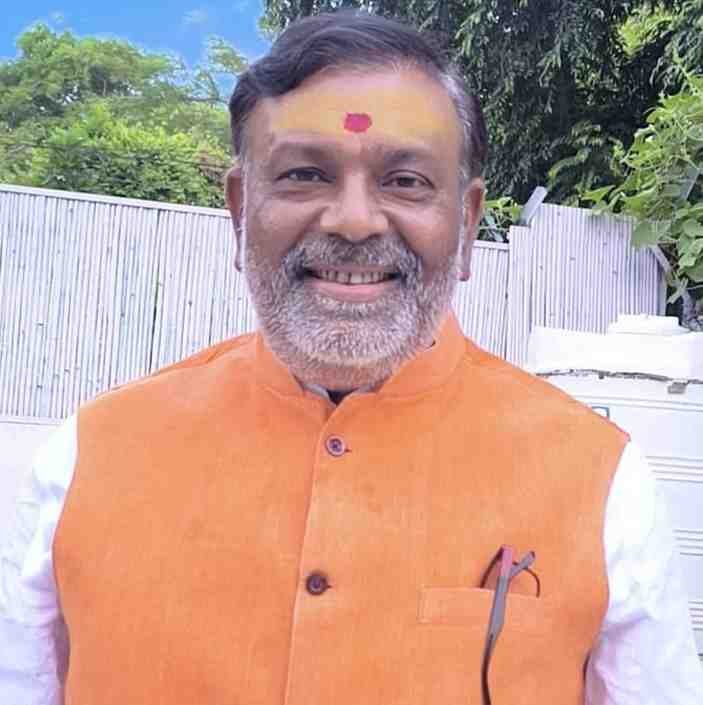New Delhi: Hindu Struggle Committee’s National General Secretary and senior BJP leader Anup Pandey has launched a scathing attack on Maharashtra Navnirman Sena (MNS) chief Raj Thackeray, accusing him of inciting regional and linguistic tensions in Mumbai.
Addressing the media, Pandey alleged that Thackeray’s recent statements and actions amount to hooliganism and are a direct threat to national unity and social harmony.
Pandey criticized Thackeray for repeatedly provoking a language-based divide, especially targeting people from states like Uttar Pradesh, Bihar, Jharkhand, Uttarakhand, Haryana, Punjab, Assam, and Bengal—many of whom have made Mumbai their home.
He warned that such rhetoric is not only disturbing the peace in Maharashtra’s capital but also impacting the overall atmosphere in the country. “Raj Thackeray is continuously spreading hatred and inciting regional conflict in Mumbai,” said Pandey.
“This divisive politics is creating insecurity among millions of people from other states who have contributed significantly to Mumbai’s development.” According to Pandey, leaving Thackeray unchecked poses a serious threat to public order and national unity.
Calling for strict legal action, Pandey said that Raj Thackeray should be arrested and prosecuted under the National Security Act (NSA) for inciting violence and attempting to disrupt communal harmony.
“He has openly threatened outsiders. His speeches are nothing short of instigating violence, and this should not be tolerated in a democratic society,” Pandey asserted.
He further lamented that the legacy of Bal Thackeray—who, according to Pandey, once stood for the unity of Hindu society—is being tarnished by his successors.
“It’s deeply unfortunate that the sons and family members of the late Bal Thackeray, who worked to unite Hindus, are now engaged in divisive politics. Uddhav and Raj Thackeray seem to be more interested in stirring hatred to gain power than in preserving unity,” he remarked.
Pandey also drew attention to the contributions of non-Marathi people to Mumbai’s growth and well-being. Recalling the 26/11 Mumbai terror attacks, he highlighted the role played by security forces and individuals from other states in saving lives, including those of Marathi citizens.
He cited the example of Marine Commando Praveen Tewatia, a native of Uttar Pradesh, who played a critical role during the 2008 terror attack.
“When terrorists attacked Mumbai, it was not Raj Thackeray or his followers who came to the rescue. It was brave soldiers like Praveen Tewatia who put their lives on the line,” Pandey said.
“He saved countless lives regardless of their language or state of origin, and among those he saved were many Marathi people.”
According to Pandey, Raj Thackeray was missing in action during the tragedy, and his so-called warriors were nowhere to be found. In contrast, Pandey said, people from all parts of India stood united during that crisis, proving that humanity transcends language and region.
This is not the first time Raj Thackeray has come under fire for his stance on non-Maharashtrians in Mumbai. Pandey reminded that in 2008 as well, MNS workers had resorted to violence against people from states like UP and Bihar. “The cycle of instigation and assault has continued, and it is high time that it ends,” he said.
Anup Pandey emphasized that the Hindu Sangharsh Samiti will not allow any attempt to fragment Hindu society or the nation on the basis of language and region.
“We are prepared to take this fight from the streets to the Parliament if necessary,” he warned. “Divisive politics has no place in our society, and we demand that the central and state governments act swiftly.”
He called upon Prime Minister Narendra Modi and Maharashtra Chief Minister Devendra Fadnavis to take immediate action to ensure that people from all parts of India can live and work in Mumbai without fear.
“We urge the government to uphold the spirit of unity and take strict steps against those who try to sabotage it,” he concluded.
The remarks by Anup Pandey add fuel to an already heated debate over regional politics and migration in India’s financial capital, with tensions between linguistic identity and national integration once again coming to the forefront.







